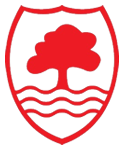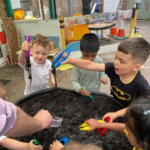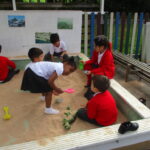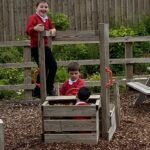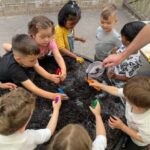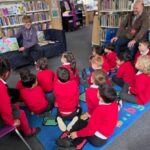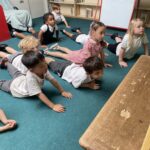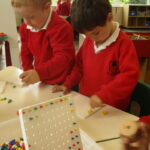A child’s first day at school can be a daunting prospect for parents and children alike. It’s only natural that you’ll want to leave your little ones safe in the knowledge that they will experience the same high standard of care and attention as they do at home.
Our Foundation Stage is not only a safe and nurturing place to learn, it’s also a fun, creative and stimulating environment within which children can really enjoy their first taste of independence. Every effort is made by the team at Oakmere School to make the transition from home to school as easy and ‘tear-free’ as possible. Our ethos is that children’s Nursery experience should be relaxed, home-like and led by their own interests. We know that children learn best when they are happy, healthy, safe and secure, when their interests are followed and when they enjoy positive relationships with the adults caring for them. In the Nursery, children learn predominantly through play. We seek to achieve a balance between adult-led and child-initiated interactions and activities. We create a purposeful learning environment, indoor and out, from which our children can choose freely and independently select and use resources. Come and join us! See our Nursery Application Policy.
In Reception class our aim is to make sure that children feel settled, confident and happy coming to school. We also strive to build supportive and positive relationships with children’s families. The Early Years Foundation Stage curriculum emphasises the development of the whole child and it is through strong relationships between home and school that we support the holistic development of the children in our class.
The EYFS is divided up into Seven Areas of Learning and Development, which are:
- Personal, Social and Emotional Development (PSED)
- Communication and Language (C+L)
- Physical Development (PD)
- Literacy (L)
- Mathematics (M)
- Understanding the World (UTW)
- Expressive Arts and Design (EAD)
The staff in our EYFS use these seven areas of learning as the basis for their planning. Each area is divided up into more distinct areas, making 17 in total. These initially consist of the prime areas of learning. Within these initial areas, children can develop a secure foundation.
The skills included in the Prime Areas are Personal, Social and Emotional Development, Communication and Language and Physical Development. By focussing on these first, children can secure the skills needed to progress within their development.
Children will then move on to more refined topics in the Specific Areas of Learning. These include Literacy, Mathematics, Understanding the World and Expressive Arts and Design.
Each of the EYFS Seven Areas of Learning and Development, and the areas within each one are:
1. Personal, Social and Emotional Development (PSED)
Personal, Social and Emotional Development (PSED) focusses on children's mental and physical wellbeing. Children work on long-term skills and awarenesses to build a healthy foundation they can take forward. It's divided into these topics:
- Self-Regulation
- Managing Self
- Building Relationships
Personal, social and emotional development (PSED) provides children with lots of social opportunities. Children can learn to form healthy bonds and make stable, lasting friendships. For example, they’ll learn what the right and wrong things to do are, alongside respect, compassion, morals, and lots more socio-emotional skills.
The subject also opens children up to discuss their thoughts and feelings. This can help them to form a level of ownership, independence, and self-esteem.
2. Communication and Language (C+L)
Communication and Language (C+L) encourages conversations and spoken language skills. Underpinning all skills, it's foundational for children to be able to interact with their peers and their learning environment. It's split into the following distinct areas:
- Listening, Attention and Understanding
- Speaking
There’s a lot more to language development and communication than simply ‘talking’. It refers to the variety of ways that children take in information, and communicate information - only a part of this is used with spoken words.
Words and image association is one of the best forms of initiating language and communication development. This is why reading books to young children is a great way of bringing this out, since they’ll be able to make a connection with the pictures in the book, and the text you’re reading out.
It’s important for practitioners to upkeep the support in early years provisions surrounding C+L, as a part of the EYFS seven areas of learning. Lots of children are increasingly beginning school with underdeveloped communication and speech skills.
3. Physical Development (PD)
Physical Development (PD) is vital for healthy lives, as well as affecting other areas of learning. Both gross and fine motor skills are developed over Early Years in activities like writing and cutting. Practitioners plan by looking at these specific areas:
- Gross Motor Skills
- Fine Motor Skills
As children move around, they’re exploring the world around them through handling objects.
If children are exposed to healthy eating and leading an active lifestyle, they’re likely to continue those positive habits as time goes on.
By children having regular physical activity in their lives, it’ll promote healthy development, growth, composition, and cardiovascular fitness. Physical development activities help children to control and manage their body movements and control. It also improves brain development, too, such as critical thinking skills and concentration, since physical fitness ensures heightened brain function.
4. Literacy (L)
Literacy (L) skills will form a strong foundation for children's school careers, and are split simply into:
- Comprehension
- Word Reading
- Writing
With literacy, as a part of the EYFS seven areas of learning, children begin to build connections between spoken sounds and the letters in writing.
In order to achieve this, they’ll need to start forming levels of experience with letters and words, pictures and objects, and sounds.
Communicating through written language is an essential part for many areas of daily living.
5. Mathematics (M)
Mathematics (M) area of learning focusses on simple concepts that are foundational to higher maths topics in KS1 and up. In EYFS children focus on the maths areas of:
- Number
- Numerical Patterns
Learning maths can help with life skills such as spatial awareness, shapes and measurement, and problem-solving.
Maths also serves for other uses like handling and managing money, telling the time, so they’re not late for any commitments they have in place, or working out distance and time together, so that they can travel.
6. Understanding the World (UTW)
Understanding the World (UTW) supports children's learning about the surrounding environment. In this area of learning, children can explore new cultures and better understand basics that we often take for granted.
- Past and Present
- People, Culture, and Communities
- The Natural World
Children will discover similarities and differences, what world and what doesn’t, what they can and cannot change, and why certain things happen within the world around them. There are lots of opportunities to experiment and investigate. From this subject out of the EYFS seven areas of learning, children can make observations and form their own opinions and theories.
As well as learning about societies and communities, cultures, people, and places, there are elements of science within this type of learning, too. For example, children will learn about the environment, such as weather conditions, plants, and wildlife.
7. Expressive Arts and Design (EAD)
Expressive Arts and Design (EAD) supports children's creative development and expression. It helps children create their own art works and encourages them to value their own thoughts, opinions and skills. The two areas in this area of learning are:
- Creating with Materials
- Being Imaginative and Expressive
Expressive arts is one of the EYFS seven areas of learning, which provides emotive sharing. They’ll be using a range of materials and activities in order to express themselves through imaginative play. This is as well as to communicate, since verbal communication can be limited at such a young age. These activities include design and technology, dance, movement, music, art, and role-play.
Early years practitioners will plan activities to cover these seven Areas of Learning. Throughout the day or session, children will have the opportunity to complete activities that cover many, if not all, of EYFS Seven the Areas of Learning and Development.
